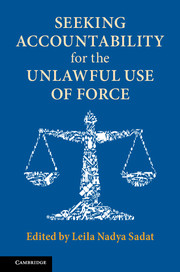Book contents
- Frontmatter
- Dedication
- Contents
- Notes on Contributors
- Foreword
- Preface
- Table of Cases
- Introduction
- PART I HISTORIC AND CONTEMPORARY PERSPECTIVES ON THE UNLAWFUL USE OF FORCE
- PART II MECHANISMS FOR RESTRAINING THE UNLAWFUL USE OF FORCE AND ENHANCING ACCOUNTABILITY
- PART III THE ILLEGAL USE OF FORCE AND THE PROSECUTION OF INTERNATIONAL CRIMES
- 12 The Crime of Aggression under Customary International Law
- 13 The Crime of Aggression and the International Criminal Court
- 14 Prosecuting Aggression Through Other Universal Core Crimes at the International Criminal Court
- 15 The Illegal Use of Force (Other Inhumane Act) as a Crime Against Humanity: An Assessment of the Case for a New Crime at the International Criminal Court
- 16 Aggression, Atrocities, and Accountability: Building a Case in Iraq
- PART IV IMAGINING A BETTER WORLD
- Epilogue
- Index
16 - Aggression, Atrocities, and Accountability: Building a Case in Iraq
from PART III - THE ILLEGAL USE OF FORCE AND THE PROSECUTION OF INTERNATIONAL CRIMES
Published online by Cambridge University Press: 21 May 2018
- Frontmatter
- Dedication
- Contents
- Notes on Contributors
- Foreword
- Preface
- Table of Cases
- Introduction
- PART I HISTORIC AND CONTEMPORARY PERSPECTIVES ON THE UNLAWFUL USE OF FORCE
- PART II MECHANISMS FOR RESTRAINING THE UNLAWFUL USE OF FORCE AND ENHANCING ACCOUNTABILITY
- PART III THE ILLEGAL USE OF FORCE AND THE PROSECUTION OF INTERNATIONAL CRIMES
- 12 The Crime of Aggression under Customary International Law
- 13 The Crime of Aggression and the International Criminal Court
- 14 Prosecuting Aggression Through Other Universal Core Crimes at the International Criminal Court
- 15 The Illegal Use of Force (Other Inhumane Act) as a Crime Against Humanity: An Assessment of the Case for a New Crime at the International Criminal Court
- 16 Aggression, Atrocities, and Accountability: Building a Case in Iraq
- PART IV IMAGINING A BETTER WORLD
- Epilogue
- Index
Summary
INTRODUCTION
Justice Robert Jackson as Chief Prosecutor for the Nuremberg Tribunal presumably did not foresee the troublesome standard he set when he wrote with regard to the war of aggression that “we are not prepared to lay down a rule of criminal conduct against others which we would be unwilling to have invoked against us.” He could not have known that more than a half-century later former Nuremberg prosecutor Benjamin Ferencz would invoke this logic when he declared the American invasion of Iraq to be a war of aggression – what Jackson also called the “supreme international crime.” Yet few expect the prosecution of such a charge against military or political leaders of the United States or the country itself.
Jonathan Bush observes that public attention is typically concentrated more narrowly on atrocities of war. A reliance on dry legal documents such as formal treaties is a barrier to successfully charging leaders or nations for committing wars of aggression and to investigating and collecting evidence of the atrocities involved. David Scheffer makes a similar point with regard to charges of genocide. He argues for applying the alternative concept of atrocity crime during the preliminary stages of building a case for charging genocide. Scheffer's goal is to get investigations started that can later lead to the filing of charges and obtaining convictions.
This seems also to have been the logic of a famous American criminologist, Sheldon Glueck, who played an important role in plans for and debates about charging the Nazi leadership at Nuremberg with waging a war of aggression. Bush writes that “Glueck is widely deemed one of the first and most significant American voices on the war crimes debate.” Justice Jackson observed of Glueck that “his original plan is substantially the system pursued throughout the Nuremberg trial.”
Bush notes that Jackson's “flattery” was primarily intended to help promote a book by his former subordinate.8 Glueck had been a helpful ally in Justice Jackson's work at Nuremberg, although in an ambivalent way. Before working with Jackson in planning the trials, in 1944 Glueck had written against war of aggression charges for the Nazi leadership.9 However, the following year brought a dramatic change.
- Type
- Chapter
- Information
- Seeking Accountability for the Unlawful Use of Force , pp. 425 - 450Publisher: Cambridge University PressPrint publication year: 2018

